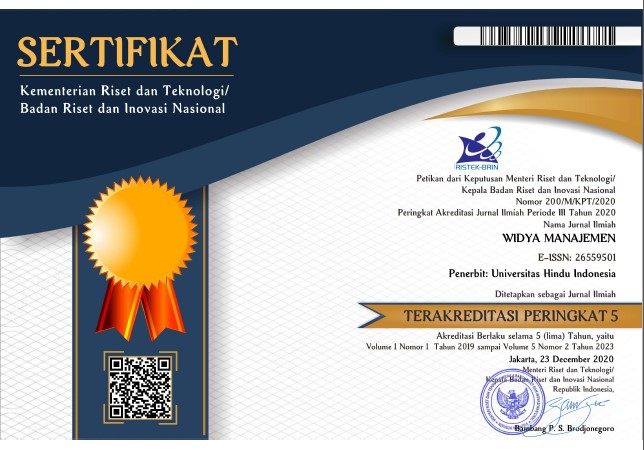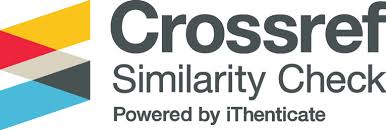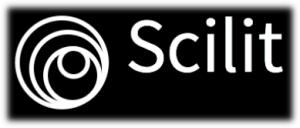Penguatan Keunggulan Bersaing BUMDes Melalui Local Wisdom Dalam Pemulihan Ekonomi di Provinsi Bali Pasca Pandemi Covid -19
Abstract
BUMDes plays a role as a driving force for the economy of the village community so that the independence and welfare of the village community is realized. Seeing the important role of BUMDes in economic development and empowering rural communities, BUMDes requires the right quality business strategy to support BUMDes' competitive advantage and performance. The competitive advantage of BUMDes is developed through village business management based on local resources by prioritizing local wisdom values ??owned by the community. The research was conducted at BUMDes in nine regencies/cities in Bali Province. This research is an Explanatory Research using a survey method in the form of distributing questionnaires. Data analysis techniques using Path Analysis and Sobel Test. The results of the study show that the quality of business strategy has a positive and significant effect on competitive advantage and BUMDes performance and competitive advantage plays a role in mediating the effect of the quality of business strategy on BUMDes performance. Based on the research results, BUMDes should be able to optimize the potential utilization of economic resources, natural resources, and human resources which can be managed into strategic assets so that BUMDes can become a cog for the village economy after the Covid-19 Pandemic.
References
Azmi, R. A. (2006). Business ethics as competitive advantage for companies in the globalization era. Available at SSRN 1010073.
Alipour, Mohammed. (2011). Working Capital Management and Corporate Profitability: Evidence from Iran
Barney, J. (1991). Firm resources and sustained competitive advantage. Journal of Management, 17(1), 99–120.
Cavusgil, S. T., & Zou, S. (1994). Marketing strategy-performance relationship: an investigation of the empirical link in export market ventures. Journal of Marketing, 58(1), 1–21.
Coleman, J. S. (1994). Foundations of social theory. Harvard university press.
Daft, Richard L.2000. Manajemen. Jakarta: PT Gelora Aksara Pratama.
Ibrahim, Ridwan, & Primiana, I. (2015). Influence of Strategic Competitive Advantage on Cooperation Performance. International Journal of Economics, Commerce and Management, 3(4), 1–18.
Ife, jim. (2002). Community Development: Community Based alternative in an Age of globalization. Australia: Parson education.
Istiawati, F. N. (2016). Pendidikan Karakter Berbasis Nilai-nilai Kearifan Lokal Adat Ammatoa dalam Menumbuhkan Karakter Konservasi. Cendekia, 10(1), 1-18.
Kadarningsih, Ana, (2013), Keunggulan Bersaing: Faktor-Faktor yang Mempengaruhi Dan Dampaknya pada Kinerja Selling-In (Studi pada Outlet Binaan PT. Indosat Semarang, Media 21 (1)
Kitching, J., Blackburn, R., Smallbone, D., & Dixon, S. (2009). Business strategies and performance during difficult economic conditions.
Kumar, V., Jones, E., Venkatesan, R., & Leone, R. P. (2011). Is market orientation a source of sustainable competitive advantage or simply the cost of competing? Journal of Marketing, Azmi, R. A. (2006). Business ethics as competitive advantage for companies in the globalization era. Available at SSRN 1010073.
Alipour, Mohammed. (2011). Working Capital Management and Corporate Profitability: Evidence from Iran
Barney, J. (1991). Firm resources and sustained competitive advantage. Journal of Management, 17(1), 99–120.
Cavusgil, S. T., & Zou, S. (1994). Marketing strategy-performance relationship: an investigation of the empirical link in export market ventures. Journal of Marketing, 58(1), 1–21.
Coleman, J. S. (1994). Foundations of social theory. Harvard university press.
Daft, Richard L.2000. Manajemen. Jakarta: PT Gelora Aksara Pratama.
Ibrahim, Ridwan, & Primiana, I. (2015). Influence of Strategic Competitive Advantage on Cooperation Performance. International Journal of Economics, Commerce and Management, 3(4), 1–18.
Ife, jim. (2002). Community Development: Community Based alternative in an Age of globalization. Australia: Parson education.
Istiawati, F. N. (2016). Pendidikan Karakter Berbasis Nilai-nilai Kearifan Lokal Adat Ammatoa dalam Menumbuhkan Karakter Konservasi. Cendekia, 10(1), 1-18.
Kadarningsih, Ana, (2013), Keunggulan Bersaing: Faktor-Faktor yang Mempengaruhi Dan Dampaknya pada Kinerja Selling-In (Studi pada Outlet Binaan PT. Indosat Semarang, Media 21 (1)
Kitching, J., Blackburn, R., Smallbone, D., & Dixon, S. (2009). Business strategies and performance during difficult economic conditions.
Kumar, V., Jones, E., Venkatesan, R., & Leone, R. P. (2011). Is market orientation a source of sustainable competitive advantage or simply the cost of competing? Journal of Marketing, 75(1), 16–30.
Mardatillah, A., & Ramadani, S. A. (2020). Sustainable Competitive Advantage of Riau Malay Weaving Industry Based on Local Wisdom. International Research Journal of Business Studies, 13(3), 227–240.
Porter, M. E., & Kramer, M. R. (2002). The competitive advantage of corporate philanthropy. Harvard Business Review, 80(12), 56–68.
Publikasi Bank Indonesia. 2021. http://www.bi.go.id. Diakses tanggal 23 January 2021
Publikasi Kementerian Desa, PDT dan Transmigrasi. 2021.https://www.kemendesa.go.id
Publikasi Pemerintah Provinsi Bali. 2021.https://www.baliprov.go.id
Ratna, Nyoman Kutha. 2011. Antropologi Sastra: Peranan Unsur-unsur Kebudayaan dalam Proses Kreatif. Yogyakarta: Pustaka Pelajar
Reimann, M., Schilke, O., & Thomas, J. S. (2010). Customer relationship management and firm performance: the mediating role of business strategy. Journal of the Academy of Marketing Science, 38, 326–346.
Siregar, A. P. (2016). Pengaruh Customer Relationship Management dan kualitas strategi bisnis terhadap keunggulan bersaing dalam meningkatkan kinerja unit (Studi Bank BNI kantor wilayah 05). Jurnal Sains Pemasaran Indonesia (Indonesian Journal of Marketing Science), 15(3), 193–205.
Suryanto, R. (2018). Peta jalan BUMDES sukses. Yogyakarta: PT Syncore Indonesia.
Sugiyono. (2012). Metode Penelitian Kuantitatif Kualitatif & RND. Bandung: Alfabeta
Unsri, S. K. M. M. (2007). “Analisis Pengaruh Kewirausahaan Korporasi Terhadap Kinerja Perusahaan Pada Pabrik Pengolahan Crumb Rubber Di Palembang”.
Reproduction Policy
Every author submitting articles to Widya Manajemen must make a statement that the manuscript is free from plagiarism and is not being considered and published in other journals.
Articles that have been published are copyrighted by the Program Studi Manajemen FEBP UNHI. For educational purposes, the contents of the article may be duplicated or reproduced as long as the source of the article is mentioned. Written requests must be submitted to the editor to obtain permission to republish the contents of the article for purposes other than educational purposes.
-----------------------------------------------------------------------------------------------------
Kebijakan Reproduksi
Setiap penulis yang menyerahkan artikel ke Widya Manajemen harus membuat surat pernyataan bahwa naskahnya bebas dari plagiarisme dan tidak sedang dipertimbangkan dan dimuat dalam jurnal lain.
Artikel yang telah dipublikasi menjadi hak cipta Program Studi Manajemen FEBP UNHI. Untuk tujuan edukatif, isi dari artikel dapat digandakan atau direpublikasi selama menyebutkan sumber dari artikel tersebut. Permintaan tertulis harus diajukan kepada editor untuk memperoleh ijin merepublikasi isi dari artikel untuk tujuan lainnya selain tujuan edukatif.






.jpg)









